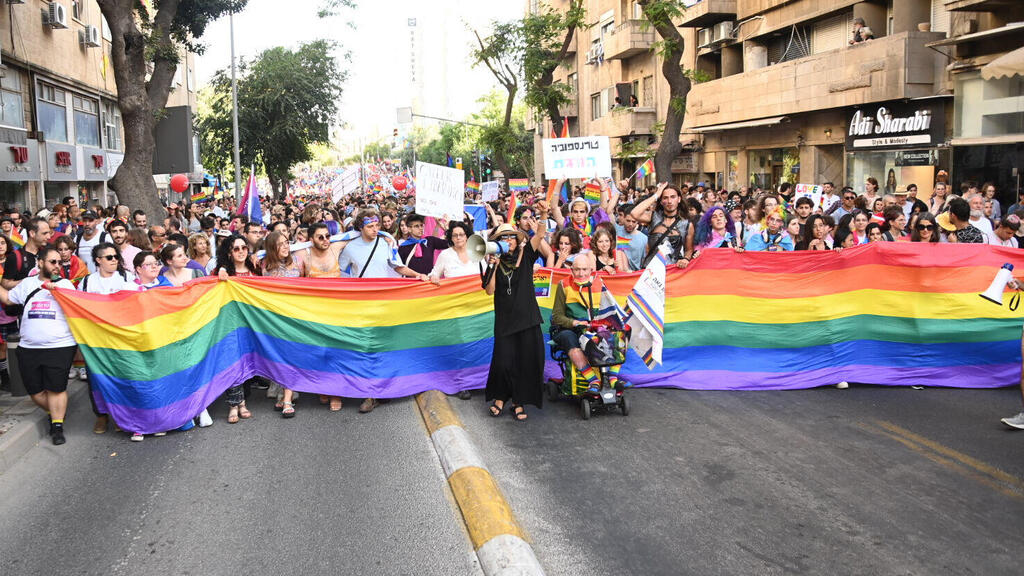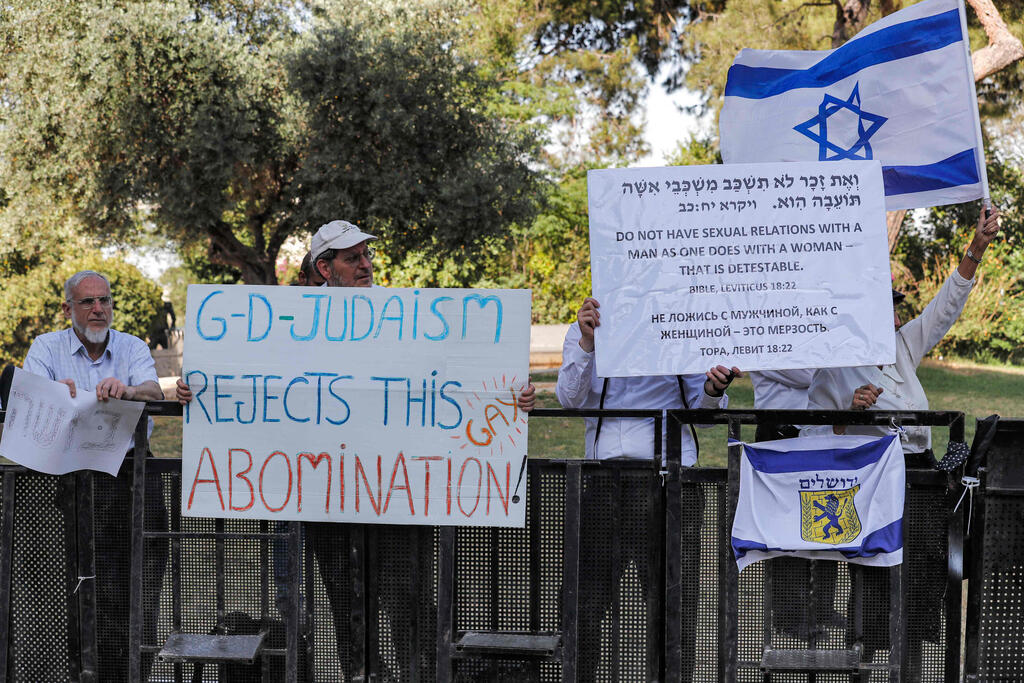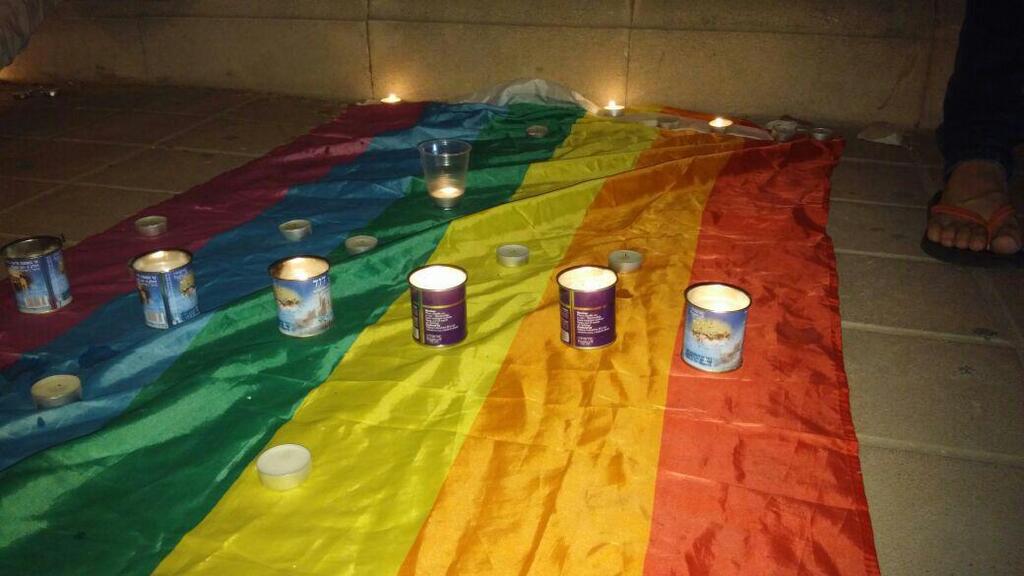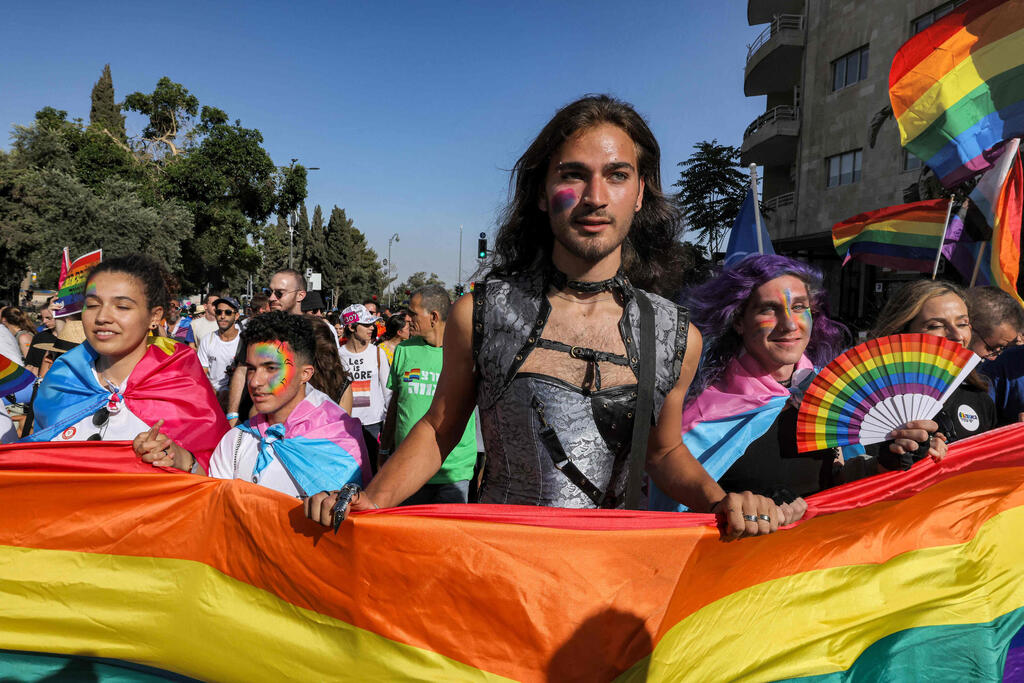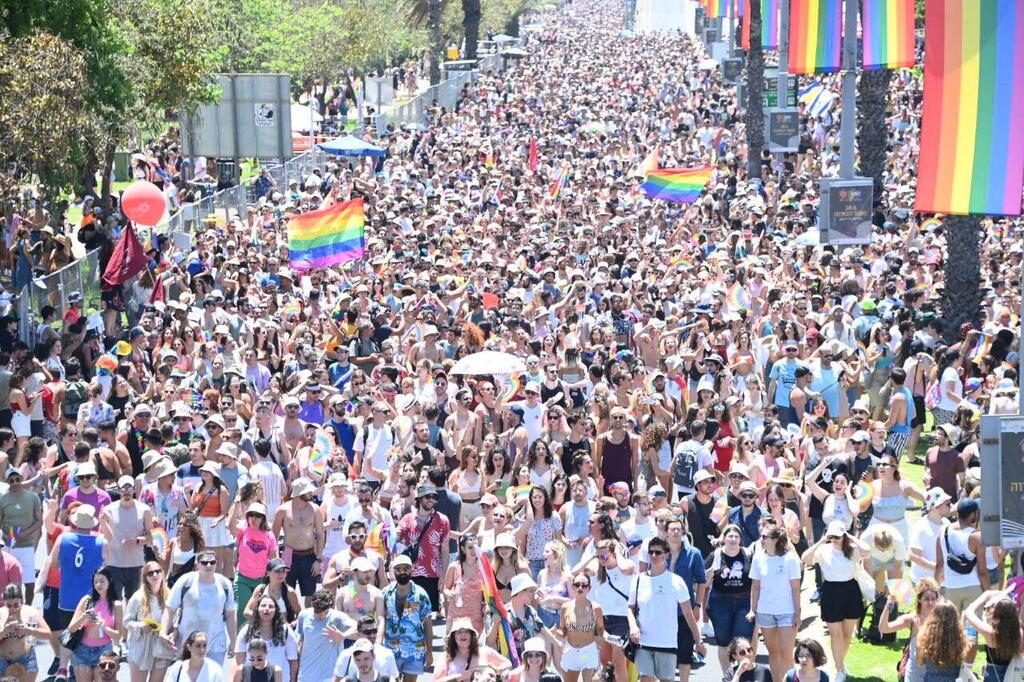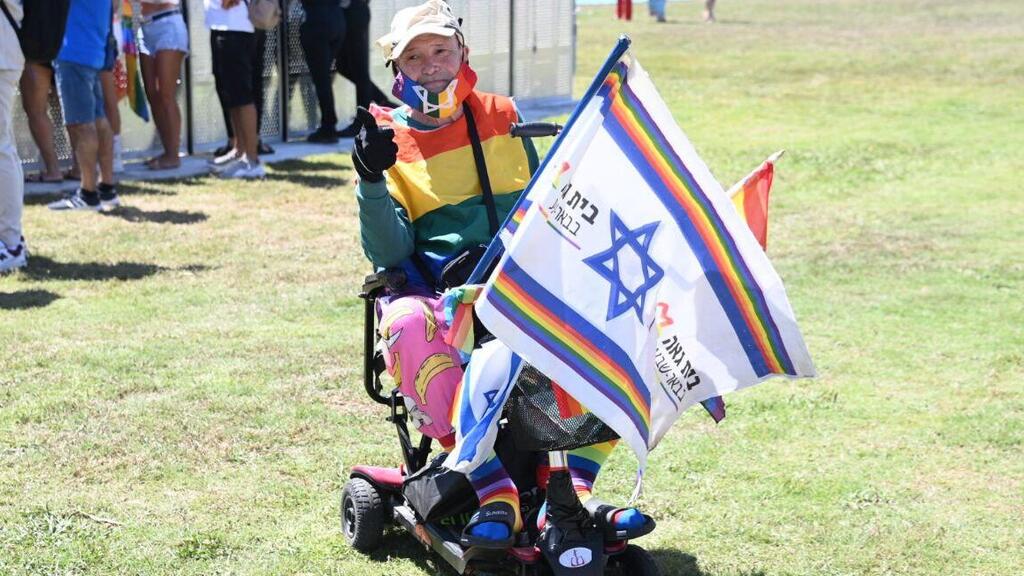Rainbow flags, billboards in solidarity, weekly parades – Pride Month 2022 came and went, bringing with it the stark reminder of contradicting realities that Israel’s LGBTQ+ community faces.
In Tel Aviv – Israel’s coastal hub of young faces and open-minded places – the month of celebrations emphasizes the thriving tolerance of LGBTQ+. Not rare are scenes of a gay couple kissing on a street bench, posters of the next drag show plastered on café windows, or rainbow flags hung on establishments throughout the city, year-round.
“It’s wonderful to be in a city that’s accepting and open,” said Tel Aviv resident Eva Fabien. “I never felt afraid to be who I am, to hold my fiancé's hand or be a couple in public.”
But some 40 miles east in the capital city of Jerusalem, the atmosphere is poles apart.
Being among the most religious and conservative cities in the world, members of Jerusalem’s LGBTQ+ community don’t experience the same level of tolerance that those in Tel Aviv enjoy.
Eliana Rohrig-Farajun, a Jerusalem resident, explained that while Pride is “everywhere” during the month of celebrations, it’s “not very visible” throughout the rest of the year.
“I wouldn’t say it’s a place where you feel comfortable to be outwardly expressing of your sexuality. It’s a traditional city. Which is why Pride is both amazing and shocking here,” she said.
LGBTQ+ in Israel
Gay rights in Israel have progressed drastically since the Jewish state’s creation in 1948, when homosexuality was outlawed.
After Israel’s 1988 Gay Revolution, which brought about the legalization of homosexuality, the LGBTQ+ community never looked back, with various forms of discrimination being prohibited since
Today, rights among Israel’s LGBTQ+ community – Lesbian, Gay, Bisexual, Transgender, Queer, and other identities – are considered the most developed in the Middle East, with Tel Aviv being the epicenter of that tolerance.
But the lingering, widespread phobia of the LGBTQ+ community in other parts of Israel, especially in Jerusalem, draws a distinct line between acceptance and lack thereof.
“It's a remarkable thing living in Israel – Tel Aviv and Jerusalem, two different worlds, just an hour apart,” said Farajun.
'Celebration with activism’
More than 7,000 people marched in early June for the Jerusalem Pride Parade – marred by violent threats made toward participants by those who oppose the event. Officers deployed in the thousands were on high alert, patrolling the march and monitoring close to 200 people who authorities said were possible threats to parade-goers.
“Police were stopping everyone, asking questions and looking at passports. The main area felt locked down and secure. That was relieving for me,” Farajun described.
Jerusalem Pride has a history of deadly violence.
In 2005, ultra-Orthodox Jew Yishai Schlissel stabbed and wounded three marchers. He was arrested and convicted, but released from imprisonment three weeks before the 2015 parade, where he again attacked participants with a knife, wounding six people and killing 16-year-old Shira Banki.
“There's a feeling of it being dangerous. I had it in mind,” said Farajun, noting the group of protestors along the outskirts of the parade’s route, something that comes with each year’s event.
“Organizers did a good job of acknowledging the tensions and normalizing that very real fear. It was beautiful that we were still there and able to march together.”
Among the aforementioned organizers included the Jerusalem Open House for Pride and Tolerance (JOH), an NGO that provides humanitarian services and promotes social change.
Alon Shachar, executive director of JOH, explained that because Jerusalem is associated with a “conservative population” and ultra-Orthodox Jews, the outside world assumes that all people there are intolerant toward the LGBTQ+ community.
“However, many Jerusalemites embrace LGBTQ+. Many see us as part of the fabric of the city, part of the colorful texture, part of what makes it so holy and unique,” Shachar said.
He noted that over the past decade, and especially since the most recent attack in 2015, “more people in Jerusalem have shifted their minds.”
Despite the melancholy atmosphere with both social change and past violence in mind, marchers took to the streets to kick off Pride Month in Israel, knowing that the parade is a crucial part of the LGBTQ+ movement’s push toward acceptance.
"It’s a celebration with activism. The numbers counted – everyone there was meaningful,” Farajun continued.
“Jerusalem is a largely religious city, but there are shades of grey. If anyone thought all religious Jews were homophobic, this parade changes that perspective and leaves you with more questions. Just that makes the parade worth it.”
‘Part of Tel Aviv culture’
In Tel Aviv, where officials estimate about a fourth of the population identifies as LGBTQ+, the Pride parade seems to have matured passed activism, evolving from a political demonstration to more of a social event since its first edition in 1977.
“You’ll never see a more happy, warm, accepting place celebrating life,” said Fabien, an annual participant of the event.
"This parade, these people give me hope. I’m proud to be here" – parade-goer Shai
At this year’s parade, over 170,000 colorful marchers – Israelis and tourists – took off on Saturday morning, dancing and chanting alongside decorated floats before reaching Tel Aviv’s Hayarkon Park, where performers entertained the spirited crowd from exuberant stages, ending the event in a rave-like setting.
For Farajun, she found solace in both parades, but for different reasons.
“In Jerusalem, it feels more meaningful,” she recalled. “There’s a lot of tears, somber speeches, emotional images. Tel Aviv is just a drunk, nude, uplifting party.”
The parade is not so much a reminder, though, as it is an emphasis on the city’s reputation for inclusivity.
"It’s a liberating feeling to walk on the streets with a rainbow flag, surrounded by people like you and allies" – parade-goer Chris
Fabien described Pride as “part of Tel Aviv culture,” adding that “it’s not just a huge celebration in June, but all year there are rainbow flags on buildings and LGBTQ+ events – it’s integrated into the city, which is very unique.”
"It is the best event in Tel Aviv. I come from Russia, so for me, it’s a big contrast, and I’m grateful to safely celebrate Pride" – parade-goer Sasha.
'A time to learn’
Despite Tel Aviv being considered by some as the “gay capital of the Middle East,” members of Israel’s LGBTQ+ community urge that there is still progress to be made.
Same-sex marriage, for example, is still not legal in Israel.
Weddings performed in the Jewish state are only available from one of the 15 religious marriage courts, none of which permit gay unions. Consequently, Israelis who wish to have their same-sex marriage formally recognized – allowing them the same civil rights as their heterosexual counterparts – must first marry outside of Israel and register upon returning home.
“I am tremendously insulted by my country,” said a Tel Aviv resident, who spoke on the condition of anonymity.
“I vote, pay my taxes, served in the army, and still I don’t get the same rights as everyone. I can’t get married here, I will need to “adopt” my child when my partner and I have a baby. It feels very unfair.”
“We’re just people that want to live normal lives and to be treated as such. There has been progress, but the issue is far from ending, unfortunately,” she said.
In Jerusalem specifically, Shachar mentioned that the problem is only exacerbated by the city’s government.
“The Jerusalem Municipality doesn’t support the LGBTQ+ community. They ignore any violence inflicted on LGBTQ+ people,” he said, recalling in 2020 when the city’s then-deputy mayor Arieh King removed a Pride Month banner that was hung on the US Embassy building.
Lack of education plays a big part in ignorance, and much of the lack of knowledge surrounding the LGBTQ+ community is of the various identities that fall under the acronym’s umbrella, according to Yarden Jalen Chichester, communications and media manager for the Maavarim NGO.
The “T” for example – which refers to those who identify as transgender – is oftentimes overlooked by people outside as well as within the LGBTQ+ community, claimed Chichester.
“As a trans person, inclusion – not just diversity – is critical to our progress. Our goal is to increase that visibility to give our community the ability to be more effective advocates for ourselves,” she said.
One of the most recent policies passed in Tel Aviv was the allowance of same-sex couples to register their marriage in the municipality – those within the city limits can enjoy the same civil rights as heterosexual couples, unique from the rest of the country.
As for Israel's public opinion, the trend seems to be shifting toward tolerance. According to a 2021 poll conducted by the Hiddush NGO, almost three-fourths of respondents nationwide voiced their support that LGBTQ+ Israelis should be allowed to marry.
“Things aren’t where they should be,” Fabien said. “But, Pride Month is a time to learn. The more people that get involved, the more openness and less ignorance there is.”
Reprinted with permission from i24NEWS


